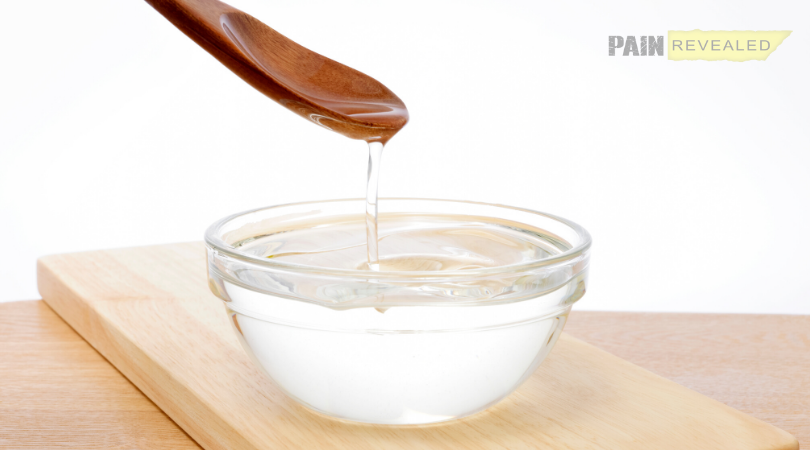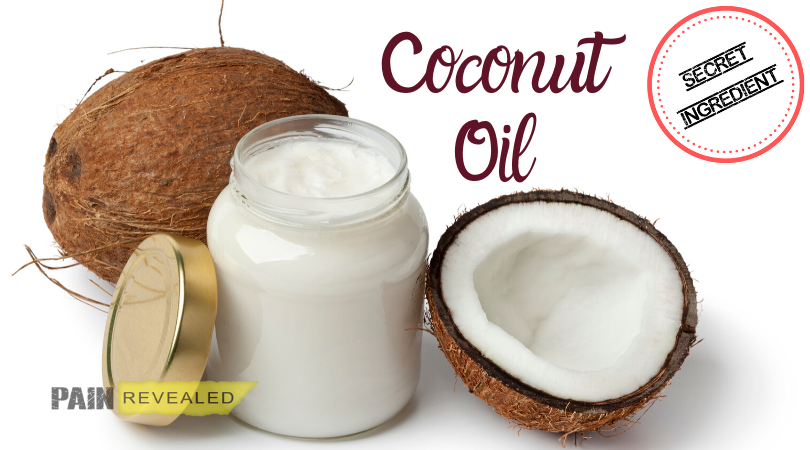Coconut oil has grown in leaps and bounds in its popularity. People are using it for skin and hair, metabolism, digestion, and cardiovascular health, among a long list of other uses. The selection of coconut oils in grocery and health food stores has grown, and sales are projected to grow another 9.8% by 2023.
It turns out this is not hype – coconut oil has a long list of benefits. For Pain Revealed (link) viewers and followers, coconut oil holds numerous benefits that can easily be added to any healthy diet and health regimen.
A Thai study from 2010 showed that coconut oil has anti-inflammatory and analgesic effects. A 2013 study from Malaysia states, “Cocos nucifera Linn. (Arecaceae), which is commonly known as coconut, is a plant possessing a lot of potential as an ingredient in traditional medicines for the treatment of metabolic disorders and particularly as an anti-inflammatory, antimicrobial and analgesic agent.”
The list goes on and on, and it turns out that research supports the beneficial effects of coconut oil. Pain Revealed expert Dr. Edward Group sums it up succinctly, “Considered a functional food, organic coconut oil is now being recognized by the medical community as a powerful tool against immune system-related diseases. Several studies have been done on its effectiveness in this area, and much research is currently underway concerning the incredible nutritional value of pure organic virgin coconut oil.”

Inflammation and pain characterize many chronic diseases including auto-immune and joint diseases. Coconut oil may relieve symptoms because of its antioxidant properties by stabilizing free radical agents in the body and neutralizing the reactive atoms that are at the root of inflammation.
Rachel Link, MS, RD of Healthline.com writes that, “It’s important to keep in mind that most current research is limited to animal and test-tube studies, so it’s hard to know how these results may translate to humans. However, based on these studies, coconut oil shows great potential in its ability to reduce inflammation when consumed or applied to the skin.”
Pain Pathways Magazine adds that coconut oil has been shown to reduce pain, “The topical application helps to increase blood supply to the arthritic area and reduce the localized pain and swelling. Many see coconut oil as extending beyond helping arthritis sufferers to those with other joint-pain conditions, such as fibromyalgia.”
How does one go about adding coconut oil to the daily diet? While options abound, many are choosing MCT oil, for its easy pourability and lack of characteristic coconut taste. MCT is liquid at room temperature year-round, as opposed to virgin coconut oil that hardens below 76 degrees.
MCT stands for medium-chain triglycerides, while pure coconut oil will also contain long-chain triglycerides as well. Both MCT and pure coconut oil have benefits, and it is up to the user to decide which is preferred – many will choose to incorporate both of these forms of the oil into their diets.

When adding coconut oil into the diet, the simplest route is to substitute other fats with coconut oil, from frying morning eggs to drizzling a little on chicken to brown it beautifully while roasting. Truly, adding coconut oil to the diet could not be simpler!
Some want to take it to the next level and really up the coconut oil. Before you grab a shot glass and start supplementing with a few daily gulps (yes, people do this!), run your plans by your healthcare practitioner. Only your practitioner knows your specific medical condition and can accurately guide you or offer precautions specific to your condition.
Additionally, if you’d like to amp up your coconut consumption, make it a gradual process. Your digestive system will thank you if you take things slowly and let it get acclimated to the extra coconut in the diet.
One fun and simple way to increase coconut intake is with a coconut oil smoothie. Simply take 1 to 1 ½ cup of your favorite milk, (whether that be dairy, almond, or soy milk or other option) and add a cup of your choice of fruit – berries make a great anti-inflammatory choice! Many people find that half a banana balances out the tartness of berries with a nice sweetness, so add that as well if you enjoy bananas. Add a cup of ice – more or less according to your tastes and slushiness desired. Whip all this up in the blender with a teaspoon of coconut oil and reap delicious benefits without even noticing a coconut taste. As your body acclimates to coconut, increase the amount.
Coconut oil has also gained tremendous popularity as an addition to coffee. A common method is to use virgin coconut oil and froth it in, sometimes including grass-fed butter in the mix. Another option is to buy full-fat coconut milk, blend it together thoroughly (a hand-frother does the trick nicely), and store it in a sealed container in the fridge for up to a week at a time. Simply scoop 2-3 tablespoons of this heavenly fluffy mixture into your morning coffee, and you’ll quickly discover that you don’t miss dairy creams and creamers one bit!
Coconut oil plays a starring role in the Pain Revealed (link) Anti-inflammation Cookbook (by Dori Madsen) as well. Here is just one mouth-watering recipe you can try:
Coconut oil plays a starring role in the Pain Revealed Anti-inflammation Cookbook (by Dori Madsen). Here is just one mouth-watering recipe you can try: Barbecued Salmon is savory, easy to make, and full of the healthy fats your body needs.
Ingredients
- 1/2 tsp Allspice
- 1 1/2 tsp Cumin
- 1 tsp Paprika
- 1/4 tsp Cayenne Pepper
- 2 Tbsp Coconut Oil melted
- Juice of 1 Lemon
- 4 six to eight-ounce pieces of Salmon
Instructions
- 1. Be sure the barbecue has been hot for a good 10 minutes.
- 2. Meanwhile, make a paste with all of the ingredients being sure they are all mixed together very well.
- 3. Rub the paste all over the skinless side of the salmon being careful not to mush it, but get it on there really well.
- 4. On one side of the grill place a piece of tin foil that the pieces of salmon will fit on.
- 5. On the other side of the grill place the salmon skin side down first and grill for 3-5 minutes.
- 6. Gingerly flip the salmon over and onto the piece of tin foil.
- 7. Continue to grill another 3-5 minutes.
- 8. slide the piece of tin foil with the salmon onto a serving plate and Enjoy!


